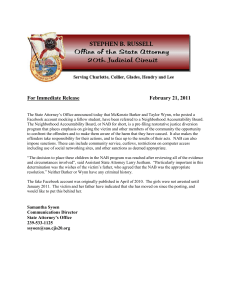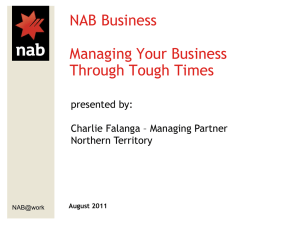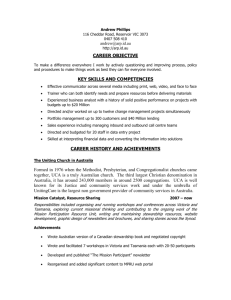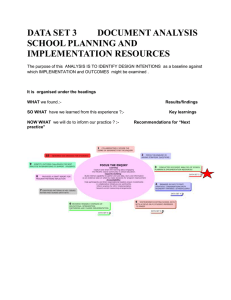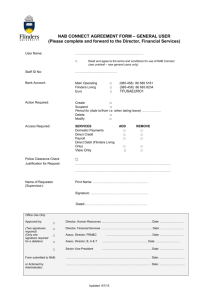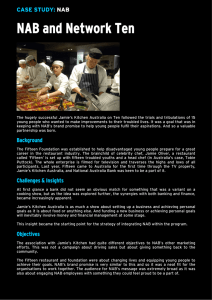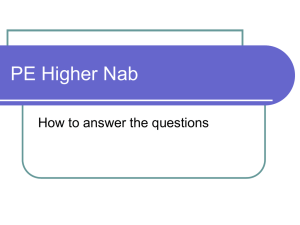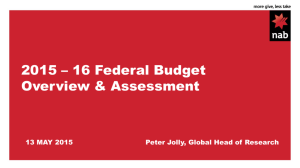View This Page in PDF - Interactive Investor
advertisement
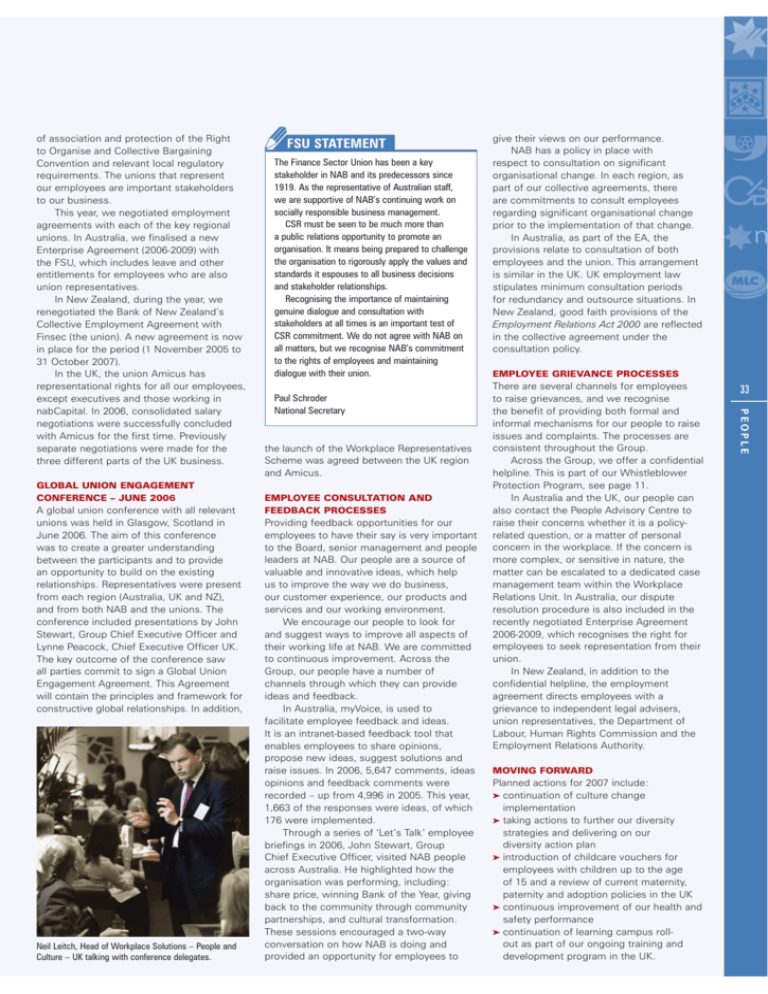
GLOBAL UNION ENGAGEMENT CONFERENCE – JUNE 2006 A global union conference with all relevant unions was held in Glasgow, Scotland in June 2006. The aim of this conference was to create a greater understanding between the participants and to provide an opportunity to build on the existing relationships. Representatives were present from each region (Australia, UK and NZ), and from both NAB and the unions. The conference included presentations by John Stewart, Group Chief Executive Officer and Lynne Peacock, Chief Executive Officer UK. The key outcome of the conference saw all parties commit to sign a Global Union Engagement Agreement. This Agreement will contain the principles and framework for constructive global relationships. In addition, Neil Leitch, Head of Workplace Solutions – People and Culture – UK talking with conference delegates. FSU STATEMENT The Finance Sector Union has been a key stakeholder in NAB and its predecessors since 1919. As the representative of Australian staff, we are supportive of NAB’s continuing work on socially responsible business management. CSR must be seen to be much more than a public relations opportunity to promote an organisation. It means being prepared to challenge the organisation to rigorously apply the values and standards it espouses to all business decisions and stakeholder relationships. Recognising the importance of maintaining genuine dialogue and consultation with stakeholders at all times is an important test of CSR commitment. We do not agree with NAB on all matters, but we recognise NAB’s commitment to the rights of employees and maintaining dialogue with their union. Paul Schroder National Secretary the launch of the Workplace Representatives Scheme was agreed between the UK region and Amicus. EMPLOYEE CONSULTATION AND FEEDBACK PROCESSES Providing feedback opportunities for our employees to have their say is very important to the Board, senior management and people leaders at NAB. Our people are a source of valuable and innovative ideas, which help us to improve the way we do business, our customer experience, our products and services and our working environment. We encourage our people to look for and suggest ways to improve all aspects of their working life at NAB. We are committed to continuous improvement. Across the Group, our people have a number of channels through which they can provide ideas and feedback. In Australia, myVoice, is used to facilitate employee feedback and ideas. It is an intranet-based feedback tool that enables employees to share opinions, propose new ideas, suggest solutions and raise issues. In 2006, 5,647 comments, ideas opinions and feedback comments were recorded – up from 4,996 in 2005. This year, 1,663 of the responses were ideas, of which 176 were implemented. Through a series of ‘Let’s Talk’ employee briefings in 2006, John Stewart, Group Chief Executive Officer, visited NAB people across Australia. He highlighted how the organisation was performing, including: share price, winning Bank of the Year, giving back to the community through community partnerships, and cultural transformation. These sessions encouraged a two-way conversation on how NAB is doing and provided an opportunity for employees to give their views on our performance. NAB has a policy in place with respect to consultation on significant organisational change. In each region, as part of our collective agreements, there are commitments to consult employees regarding significant organisational change prior to the implementation of that change. In Australia, as part of the EA, the provisions relate to consultation of both employees and the union. This arrangement is similar in the UK. UK employment law stipulates minimum consultation periods for redundancy and outsource situations. In New Zealand, good faith provisions of the Employment Relations Act 2000 are reflected in the collective agreement under the consultation policy. EMPLOYEE GRIEVANCE PROCESSES There are several channels for employees to raise grievances, and we recognise the benefit of providing both formal and informal mechanisms for our people to raise issues and complaints. The processes are consistent throughout the Group. Across the Group, we offer a confidential helpline. This is part of our Whistleblower Protection Program, see page 11. In Australia and the UK, our people can also contact the People Advisory Centre to raise their concerns whether it is a policyrelated question, or a matter of personal concern in the workplace. If the concern is more complex, or sensitive in nature, the matter can be escalated to a dedicated case management team within the Workplace Relations Unit. In Australia, our dispute resolution procedure is also included in the recently negotiated Enterprise Agreement 2006-2009, which recognises the right for employees to seek representation from their union. In New Zealand, in addition to the confidential helpline, the employment agreement directs employees with a grievance to independent legal advisers, union representatives, the Department of Labour, Human Rights Commission and the Employment Relations Authority. MOVING FORWARD Planned actions for 2007 include: ➤ continuation of culture change implementation ➤ taking actions to further our diversity strategies and delivering on our diversity action plan ➤ introduction of childcare vouchers for employees with children up to the age of 15 and a review of current maternity, paternity and adoption policies in the UK ➤ continuous improvement of our health and safety performance ➤ continuation of learning campus rollout as part of our ongoing training and development program in the UK. 33 PEOPLE of association and protection of the Right to Organise and Collective Bargaining Convention and relevant local regulatory requirements. The unions that represent our employees are important stakeholders to our business. This year, we negotiated employment agreements with each of the key regional unions. In Australia, we finalised a new Enterprise Agreement (2006-2009) with the FSU, which includes leave and other entitlements for employees who are also union representatives. In New Zealand, during the year, we renegotiated the Bank of New Zealand’s Collective Employment Agreement with Finsec (the union). A new agreement is now in place for the period (1 November 2005 to 31 October 2007). In the UK, the union Amicus has representational rights for all our employees, except executives and those working in nabCapital. In 2006, consolidated salary negotiations were successfully concluded with Amicus for the first time. Previously separate negotiations were made for the three different parts of the UK business.
